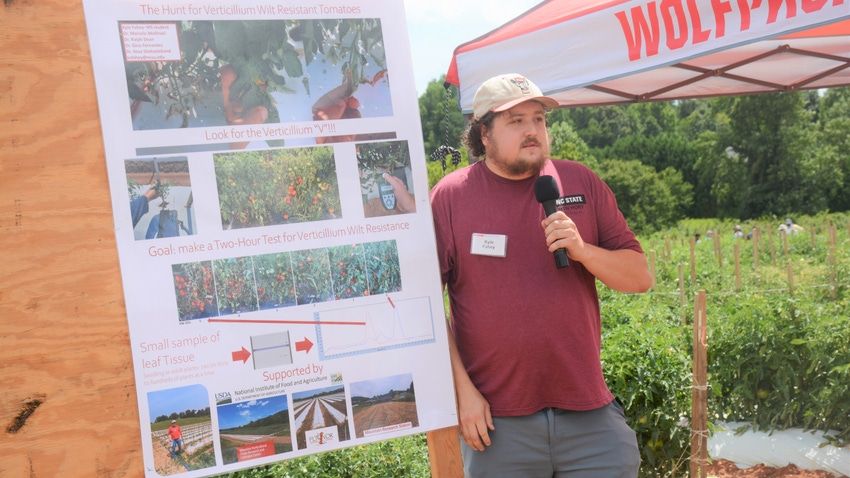
At a Glance
- Scientists at NCSU are studying 552 tomato breeding lines to find breeds with resistance to non-race 1 verticillium wilt.
The nemesis soil-borne disease known as verticillium wilt has plagued tomato farmers in North Carolina and other states for decades because it can defoliate tomato plants, stunt plant growth and harm yield.
Scientists at North Carolina State University began a breeding program four years ago to find tomato lines resistant to the troublesome disease. Kyle Fahey, a graduate research assistant working out of the Mountain Horticultural Crops Research Station and Extension Center in Mills River, says he and Dr. Reza Shekasteband, N.C. Cooperative Extension research scholar, are examining 552 tomato breeding lines that show very good resistance to non-race 1 verticillium wilt.
“We will go out every year and we will rate the disease on the plants and that allows us to accept the best plants year after year and essentially work toward the best plant that we can produce,” Fahey said at an Aug. 10 field day at the Mountain Horticultural Crops Research Center.
Researching effective treatment
Fahey explained that verticillium wilt is a soil-borne disease that starts in the roots and climbs up to the main stem, clogging up the vasculature and causing wilt symptoms in the plant. This robs the plant of water and nutrients, primarily water.
Fahey said the challenge is there aren’t many control measures that are effective in controlling verticillium wilt which is why breeding disease-resistant tomato varieties is so critical. He said crop rotation won’t work to control the disease because the pathogen can survive in the soil from 10 to 20 years.
“Even if you could take your field out of tomatoes for 10 to 20 years, you then have weedy host species so that if a weed comes into your field and the Verticillium can survive on it, then you start the timer over again,” Fahey said on the field day.
Fahey explained that his research project is looking to develop a test that can be run on tomato lines in the NCSU population to determine if a plant is resistant or susceptible to non-race 1 verticillium wilt. He said the basis of the test is a process known as PCR, which is essentially a copy machine for a specific strain of DNA.
“I would like to be able to essentially take any small sample of leaf tissue and tell you whether this plant is resistant or susceptible. And you can do that at any age, at any point in the growing time. If you think about that, you could take out 100 seedlings in a small tray and you could test them all and only plant out the ones that are good in your breeding population. We want to just be able to focus on the ones that offer the best resistance possible and make it even better,” Fahey explained.
Read more about:
TomatoesAbout the Author(s)
You May Also Like






